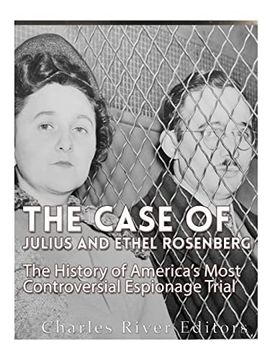The Case of Julius and Ethel Rosenberg: The History of America’S Most Controversial Espionage Trial (en Inglés)
Reseña del libro "The Case of Julius and Ethel Rosenberg: The History of America’S Most Controversial Espionage Trial (en Inglés)"
*Includes pictures *Includes accounts of the trial and testimony *Includes online resources and a bibliography for further reading *Includes a table of contents "This death sentence is not surprising. It had to be. There had to be a Rosenberg case, because there had to be an intensification of the hysteria in America to make the Korean War acceptable to the American people. There had to be hysteria and a fear sent through America in order to get increased war budgets. And there had to be a dagger thrust in the heart of the left to tell them that you are no longer gonna get five years for a Smith Act prosecution or one year for contempt of court, but we're gonna kill ya!" - Julius Rosenberg In 1947, President Truman had tried to assure Americans, "I am not worried about the Communist Party taking over the Government of the United States, but I am against a person, whose loyalty is not to the Government of the United States, holding a Government job. They are entirely different things. I am not worried about this country ever going Communist. We have too much sense for that." Nonetheless, shortly after World War II, Congress' House Committee on Un-American Activities began investigating Americans across the country for suspected ties to Communism. The most famous victims of these witch hunts were Hollywood actors, such as Charlie Chaplin, whose "Un-American activity" was being neutral at the beginning of World War II, but at the beginning of the Cold War, America was gripped by the Red Scare. The Red Scare would reach a fever pitch after Wisconsin Senator Joseph McCarthy made waves in 1950 by telling the Republican Women's Club in Wheeling, West Virginia that he had a list of dozens of known Communists working in the State Department. The political theater helped Senator McCarthy become the prominent anti-Communist crusader in the government, and McCarthy continued to claim he held evidence suggesting Communist infiltration throughout the government, but anytime he was pressed to produce his evidence, McCarthy would not name names. Instead, he'd accuse those who questioned his evidence of being Communists themselves. The case of Alger Hiss and the rise of McCarthyism were undoubtedly instrumental in the way that one of the most notorious cases in American history unfolded in the early 1950s. After years of keeping tabs on Julius and Ethel Rosenberg, the two Communist sympathizers were indicted on charges of treason and conspiracy to commit espionage for passing off secrets about the atomic bomb to the Soviet Union. In the context of the Cold War and the Korean War, there could hardly be more serious charges, but the couple strenuously asserted their innocence, even after they were implicated by Ethel's own brother, David Greenglass. Throughout the trial and its aftermath, many Americans believed the Rosenbergs were innocent and/or were facing an unduly harsh death sentence. Indeed, authorities had hoped to wring confessions out of the two by threatening them with the chair, but they held steadfast all the way up until their executions on June 19, 1953. In the over 60 years since, there has been plenty of debate over whether the two of them were guilty, and, if so, what the extent of their espionage was. While historians have used declassified documents and memoirs of involved individuals to reach the widespread belief that Julius Rosenberg did commit espionage, there is still a lot of doubt regarding Ethel's involvement, and scholars still debate just what Julius may have sent the Soviets. The mystery and intrigue still surrounding the case, trial, and executions continue to fascinate people and generate plenty of ongoing speculation. The Case of Julius and Ethel Rosenberg: The History of America's Most Controversial Espionage Trial chronicles the events that led to the infamous trial and execution of the Rosenbergs.

